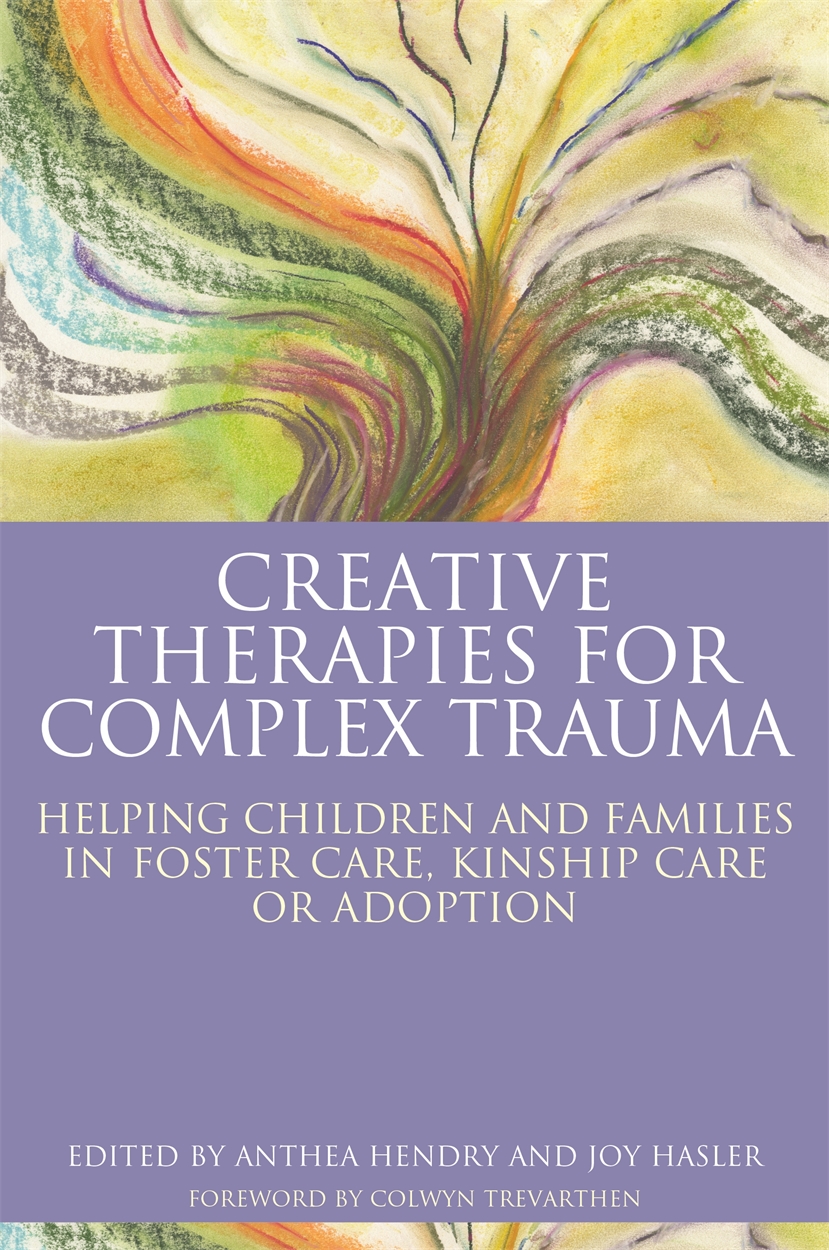Anyone who would like to borrow any of the books below can do so by contacting the Association on 79981795
FOSTER CARERS: WHY THEY STAY AND WHY LEAVE
Foster carers look after two-thirds of the children cared for by English local authorities at any one time. The recruitment and retention of these carers is one of these authorities’ central concerns. Against this background, Foster Carers examines the joys, sadnesses and strains of fostering, the support carers want and need, and the reasons why they continue or cease fostering. Drawing on questionnaire responses from a thousand foster carers across seven different local authorities, the authors highlight the importance of providing support that: * is adapted to the carers’ families * contains the basic elements of reasonable payment, relevant training and reliable social work support * responds sensitively to serious crises and treats carers as part of a team * meets the specific needs of carers such as carers’ groups and relief breaks. Foster Carers forms one part of the largest recent study into foster care in the UK. It is an invaluable resource for policy makers and practitioners, as well as local authorities formulating policies for the support and training needed by foster carers, and is essential reading for social work professionals, academics and foster carers themselves.
FOSTER CHILDREN: WHERE THEY GO AND HOW THEY GET ON
What happens to looked-after children in the longer term? This book analyses the outcomes of a large-scale study of foster children in the UK. It includes individual case studies and draws extensively on the views of foster children themselves. The authors examine: Why children remain fostered or move to different settings (adoption, residential care, their own families or independent living) How the children fare in these different settings and why What the children feel about what happens to them. Other important issues covered include the support given to birth families to enable children to return home, the experience of adopters, the ways in which foster care can become more permanent and the experiences of young people in independent living. In bringing together these results the book provides a wealth of findings, many of them new and challenging. It offers positive and practical recommendations and will be an enduring resource for practitioners, academics, policy makers, trainers, managers and all those concerned with the well-being of looked-after children.
FOSTER PARENTING STEP-BY-STEP: HOW TO NURTURE THE TRAUMATIZED CHILD AND OVERCOME CONFLICT
‘My mama, she is supposed to take care of me, that is her job, not you, I guess she just doesn’t care.’ When parents decide to foster, they are faced with many difficult decisions, dilemmas and questions. How do you navigate the daily struggles of foster parenting? How can you nurture bonds with your foster child who is angry, sad, and defiant? How can you prepare to step back when it’s time to let go? Foster Parenting Step-by-Step is a concise, realistic how-to guide to fostering that summarizes what to expect as a foster parent, and gives hope and immediate hands-on solutions. It guides you through the different stages of a fostering relationship, including common issues encountered at each age and how to tackle them. It also explains the impact of trauma on your child: how this can show itself through challenging behaviour and how to respond to it. This is a book will empower fostering parents with the skills and knowledge to be more successful in their parenting and to give the children they care for the best possible opportunities in life. It will be invaluable not just to foster parents but also to those professionals supporting foster placements.
FOSTER PLACEMENTS: WHY THEY SUCCEED AND WHY THEY FAIL (SUPPORTING PARENTS)
How can we determine success in foster placements? Based on exhaustive research, the authors discuss the primary concerns in foster placement planning, considering the high frequency of placement breakdowns, their impact on the child’s behaviour and school performance, and the challenges this places on foster families. The specific needs of the foster child are given close attention in determining a pathway to success. By monitoring and describing the individual characteristics of the child within the context of the placement, the authors are able to reveal what types of supports are most beneficial. The implications for this research are considerable. Social workers are given new methods of assessing the needs of foster children which emphasise the process of care and not just the outcome. Policy makers are provided with rich qualitative accounts with which to increase and strengthen the success of foster placements. This is essential reading for social workers, policy makers and foster families.
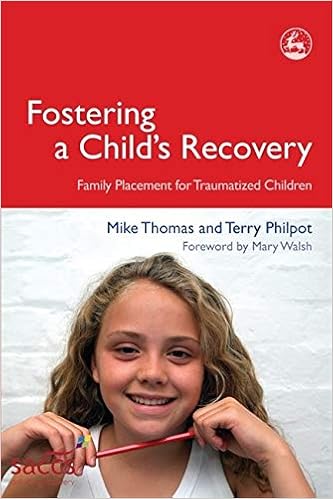
FOSTERING A CHILD’S RECOVERY: FAMILY PLACEMENT FOR TRAUMATIZED CHILDREN
The overwhelming majority of children and young people in care today are fostered, but for some, this only increases their problems through untreated trauma, ill-judged placements, poorly supported foster carers and multiple moves. This practical and evidence-based book outlines the principles of family placement on the basis of planning and evidence and explores the qualities, skills and insights that create positive placement outcomes. Fostering a Child’s Recovery shows how the key to good fostering is well-trained and skilled foster carers who form part of a team of professionals who surround the child. This book will benefit all professionals and parents involved in providing recovery for traumatized children and young people in ensuring successful placements.
THE CONNECTED CHILD: BRING HOPE AND HEALING TO YOUR ADOPTIVE FAMILY
The adoption of a child is always a joyous moment in the life of a family. Some adoptions, though, present unique challenges. Welcoming these children into your family–and addressing their special needs–requires care, consideration, and compassion. Written by two research psychologists specializing in adoption and attachment, The Connected Child will help you:
- Build bonds of affection and trust with your adopted child
- Effectively deal with any learning or behavioral disorders
- Discipline your child with love without making him or her feel threatened
CHILD-CENTRED FOSTER CARE: A RIGHTS-BASED MODEL FOR PRACTICE
Fostering is vitally important: the majority of looked after children are fostered, yet these children are often left out of the agenda and their voices are not heard. This book sets out a child-centred approach to foster care which argues against thinking about children purely from a psychological perspective and instead places children’s views, rights and needs at the centre of care. It sets out the theory behind working in partnership with children who are fostered and discusses children’s views about fostering systems and living with foster carers. The book then outlines how to put the theory into practice, offering models, processes and best practice examples. Practical advice is given on establishing effective communication and good working relationships between practitioners, carers and foster children. This insightful book aims to promote better services and outcomes for fostered children, and will be essential reading for social work practitioners and students.
UNDERSTANDING AND WORKING WITH PARENTS OF CHILDREN IN LONG-TERM FOSTER CARE
For children growing up in foster care, the role of their birth parents is an important factor in the success of their long-term placements. Understanding the experiences of parents is therefore essential in order to develop effective social work practice with parents that can also ensure the best possible outcomes for children. Drawing on detailed and often moving interviews with parents, the book takes a chronological approach, starting with their accounts of family life before their children were taken into care, in particular the impact of drugs, alcohol and domestic violence. It goes on to explore their experiences of court and then how they seek to come to terms with their loss, sustain an identity as a parent and manage a relationship with their children through contact. Parents’ views on what they find valuable and helpful in relationships with foster carers and social workers are also discussed. The book then draws on the views of social workers on the opportunities and challenges of supporting parents, while also remaining child-focussed. The authors set out a model of good practice, based on the lessons learnt from the experiences of these parents and social workers. This book will be essential reading for all child and family social workers, fostering social workers, independent reviewing officers, academics and foster carers.
TEAM PARENTING FOR CHILDREN IN FOSTER CARE: A MODEL FOR INTEGRATED THERAPEUTIC CARE
How can professionals work together with foster carers to create stable and therapeutic foster placements?
Team Parenting for Children in Foster Care describes a unique model of supporting children in care that involves foster carers and professionals working together in the best interests of the child. This book lays out the key principles of Team Parenting – to meet the needs of troubled young people in an integrated way and incorporate therapy within a wider team of social workers, therapists, psychologists and foster carers – as well as the theory behind it and interventions used. It details how the approach contributes to the recovery of looked after children and each chapter includes examples that illustrates how Team Parenting works in practice. Team Parenting for Children in Foster Care includes ideas for systems and individual practice that will inform and improve foster carers’ and professionals’ work in any setting.
CREATIVE THERAPIES FOR COMPLEX TRAUMA: HELPING CHILDREN AND FAMILIES IN FOSTER CARE, KINSHIP CARE, AND ADOPTION
A burgeoning evidence base supports that arts, play and other creative therapies have the potential to help children in foster care, kinship care or adoptive families to recover from complex trauma. Written by contributors working at the cutting edge of delivering effective therapeutic interventions, this innovative book describes models for working with children in foster care, kinship care or adoption. Covering how to assess needs and contextual considerations for working with children and families, this book presents a range of creative therapeutic approaches spanning art psychotherapy, music therapy and dance therapy. It emphasizes the necessity of working with caregivers and other significant adults, as well as the child, to facilitate recovery. The theoretical foundations of attachment, developmental psychology and neurobiology are embedded in each chapter showing how they underpin each of the recommended creative therapies. This book will be suitable for professionals directly employing creative approaches in their practice, such as arts therapists and play therapists, as well as those working with children who are interested in creative alternate approaches, such as psychologists, counsellors, therapists and social workers.
ACHIEVING POSITIVE OUTCOMES FOR CHILDREN IN CARE
For over a decade and with the best of intentions, the U.K. government has spent millions attempting, but largely failing, to improve personal, social and educational outcomes for children and young people in public care. In this book, the authors explain why the problems of this highly vulnerable group have resisted such effort, energy and expenditure and go on to show how achieving positive outcomes for children in care is possible when the root causes of failure are tackled.
Topic covered include: – The power of parenting – The impact of parental rejection on emotional development – Support for the adaptive emotional development of children and young people – Practical advice on introducing the ′Authentic Warmth′ approach into existing childcare organisations – Future issues in childcare
This book is essential reading for carers, commissioners, policymakers, support professionals, educational psychologists, designated teachers and students of social work.
FROM FEAR TO LOVE
Provides new and highly effective techniques for parents dealing with behavioral challenges with their children. Intended for parents, adoptive parents, foster parents and caretakers of at-risk, ADD/ADHD/RAD,ODD, adopted children and children with behavioral and emotional challenges
Bryan Post speaks to parents about the challenges they face when dealing with behaviors that are often present for adopted children. He helps parents understand the impact of early life trauma and the impact of interruptions in the attachment process. In his compassion for parents and children he offers hope and solutions for the challenges families face. Many parents of adopted children express their fear not only for their child s present behaviors but for what will become of them in the future. Bryan’s straightforward, clear-cut approach has created peace and healing for hundreds of families; families who once operated in fear, are now experiencing love.
Beyond The Foster Care System: The Future for Teens
Each year tens of thousands of teenagers are released from the foster care system in the United States without high school degrees or strong family relationships. Two to four years after discharge, half of these young people still do not have either a high school diploma or equivalency degree, and fewer than ten percent enter college. Nearly a third end up on public assistance within fifteen months, and eventually more than a third will be arrested or convicted of a crime.
Understanding Children in Foster Care: Identifying and addressing what children learn from maltreatment
This book introduces the Relational Learning Framework (RLF), an assessment tool that helps foster care practitioners, social workers, and foster carers examine what foster children have learned in their early life about relationships and particularly through maltreatment. Grounded in attachment theory and drawing on cognitive theory this book will help practitioners to understand and respond to the challenging behaviour presented by these children and remove barriers to an empathic response.
Early chapters provide the context in a theoretical discourse on the causes and consequences of psychological and attachment difficulties for children in care, including a discussion of maltreatment and foster care. The theoretical basis of the technique will be outlined and subsequent chapters will explain how to undertake RLF including the wide-ranging practice evidence, a worked example, common themes, and troubleshooting.
This will be an invaluable source for clinical practitioners, social workers, foster care practitioners, and foster parents who want to make sense of the complex information about children in foster care to improve their relationships. It will also provide insight into foster children’s mental health and behaviour for academics and postgraduate students in related disciplines.

Fostering Mixed Race Children: Everyday Experiences of Foster Care
The ‘mixed race’ classification is known to be a factor of disadvantage in children’s social care and this fastest-growing population is more likely than any other ethnic group to experience care admission. How does knowledge of ‘mixedness’ underpin policy and practice? How, when, and why is the classification ‘mixed’ a disadvantage? Through narrative interviews with children currently in foster care, Fostering Mixed Race Children examines the impact of care processes on children’s everyday experiences. Peters shows how the ‘mixed race’ classification affects care admission, including both short and long-term fostering and care leaving, and shapes the experiences of children in often adverse ways. The book moves away from the psychologising of ‘mixedness’ towards a much-needed sociological analysis of ‘mixedness’ and ‘mixing’ at the intersection of foster care processes.
This book will be of interest to academics and practitioners working with families and children. Peters presents a child-centred narrative focus and offers unique insights into a complex area.
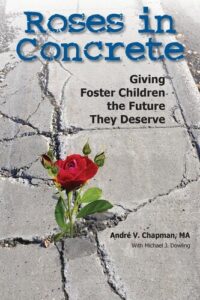
Roses in Concrete: Giving Foster Children the Future They Deserve
André Chapman left his lucrative Silicon Valley career in high-tech sales to work full-time in the field of foster care. Some questioned that move. But twenty-five years later, Unity Care Group, the organization he founded and directs, serves thousands of foster children and families, while stimulating revolutionary improvements in the fields of foster care and public education.
Through these pages, you will be:
* Encouraged by this man’s remarkable story of courage, faith, and vision.
* Challenged by his innovative ideas for transforming our broken educational and foster-care systems.
* Inspired by his devotion to bringing hope to the hopeless while growing “roses in concrete.”
* What can you do to carry this message and also make a difference?

Creating New Families: Therapeutic Approaches to Fostering, Adoption, and Kinship Care
Creating New Families is intended to reflect the practice of the specialist, multi-disciplinary Fostering and Adoption team in the Child and Family Department of the Tavistock Clinic. The team is firmly rooted in an approach which values inter-disciplinary working for the contribution which the thinking of each discipline makes to the overall endeavour with the child and family. It also places great importance on multi-agency collaboration, especially with social services and education, without which no intervention with this group of children can succeed. The book represents the differing ways in which members contribute to the work of the team, with individual and joint accounts by clinicians of the ways in which their therapeutic practice has evolved and about the theoretical thinking on which it is based.
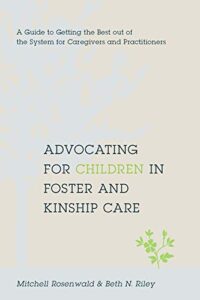
Advocating for Children in Foster and Kinship Care: A Guide to Getting the Best out of the System for Caregivers and Practitioners
This book is the first to provide strategies for effective advocacy and placement within the foster care and kinship care systems. It also takes a rare look at the dynamics of the foster and kinship relationship, not just among children and the agency workers and service providers who intervene on their behalf, but also between children and those who take in and care for them as permanency develops. Drawing on their experience interacting with and writing about the institution of foster care, Mitchell Rosenwald and Beth N. Riley have composed a unique text that helps practitioners, foster parents, and relative caregivers realize successful transitions for youth, especially considering the traumas these children may suffer both before and after placement.
Advocating for a child’s best interests must begin early and remain consistent throughout assignment and adjustment. For practitioners, Rosenwald and Riley emphasize the best techniques for assessing a family’s capabilities and for guiding families through the challenges of foster care. Part one details the steps potential foster parents and kinship caregivers must take, with the assistance of practitioners, to prepare themselves for placement. Part two describes tactics for successful advocacy within the court system, social service agencies, schools, and the medical and mental health establishments. Part three describes how to lobby for change at the agency and legislative levels, as well as within a given community. The authors illustrate recommendations through real-life scenarios and devote an entire chapter to brokering positive partnerships among practitioners, families, and other teams working to protect and transition children.
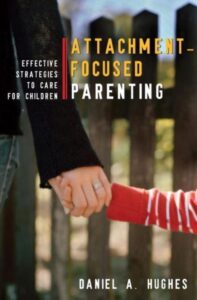
Attachment-Focused Parenting: Effective Strategies to Care for Children
Attachment security and affect regulation have long been buzzwords in therapy circles, but many of these ideas-so integral to successful therapeutic work with kids and adolescents- have yet to be effectively translated to parenting practice itself. Moreover, as neuroscience reveals how the human brain is designed to work in good relationships, and how such relationships are central to healthy human development, the practical implications for the parent-child attachment relationship become even more apparent.
Here, a leading attachment specialist with over 30 years of clinical experience brings the rich and comprehensive field of attachment theory and research from inside the therapy room to the outside, equipping therapists and caregivers with practical parenting skills and techniques rooted in proven therapeutic principles.
A guide for all parents and a resource for all mental health clinicians and parent-educators who are searching for ways to effectively love, discipline, and communicate with children, this book presents the techniques and practices that are fundamental to optimal child development and family functioning-how to set limits, provide guidance, and manage the responsibilities and difficulties of daily life, while at the same time communicating safety, fun, joy, and love. Filled with valuable clinical vignettes and sample dialogues, Hughes shows how attachment-focused research can guide all those who care for children in their efforts to better raise them.
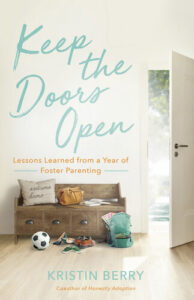
Keep the Doors Open: Lessons Learned from a Year of Foster Parenting
Will You Open Your Heart and Home to Children in Need?
As a teenager, Kristin Berry had heard all the horror stories surrounding foster care and adoption—abuse, neglect, rejection, anger, and misunderstandings. But instead of closing her heart, God opened it wide. This is Kristin’s honest, unvarnished story of some of her experiences as a foster parent of twenty-three children over the course of nine years. What she learned is that living in a foster home is like living with a revolving door. You never know who will arrive or who you will have to say goodbye to. Leaving the door open means there will be heartache and pain, but also adventure and unexpected joy. Kristin and her husband, Mike, have been through it all in their unique parenting journey. If you have ever wondered what it’s really like to be a foster parent, this book will help you gain a true understanding of the everyday trials and triumphs these moms and dads face. It will also inspire you to consider opening your door…and to leave it wide open.
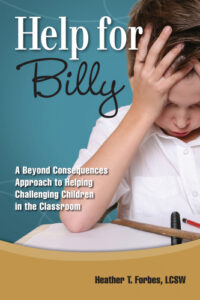
Help for Billy: a beyond consequences approach to helping challenging children in the Classroom
“Help for Billy” is a pragmatic manual to help guide families and educators who are struggling with traumatized children. Based on the concept of the neuroscience of emotions and behavior, Heather Forbes provides detailed, comprehensive, and logical strategies for teachers and parents. This easy-to-read book, with tables, outlines and lists clears the way for a better understanding of the true nature of traumatic experiences affecting the brain and learning. It is a must-read for anyone working with a child in the classroom.

Creating Compassionate Foster Care: Lessons of Hope from Children and Families in Crisis
“Drawing on over 20 years of work in foster care, along with current attachment research and theory, this book conveys the foster care experience with recommendations for improved models of care and intervention strategies. Engaging case studies depict the challenging nature of determining the best outcome for a child and supporting the adult’s journey as a parent. Written in a narrative style and supported by in-depth research, this book will aid social workers and foster care professionals to better understand families in crisis and to further develop their practice.”
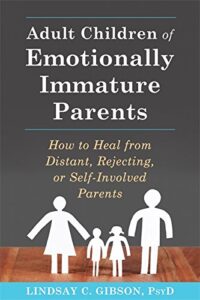
Are you one of the countless people who grew up with emotionally immature parents? If you suffer from this troubling parent/child dynamic, you may still recall painful moments from your childhood when your emotional needs were not met, when your feelings were dismissed, or when you took on adult levels of maturity to “compensate” for your parent’s behaviour. And while you likely cultivated strengths such as self-reliance and independence along the way- strengths that have served you well as an adult- having to be emotionally mature in your relationship with your parent is confusing and even damaging. If you are ready to gain the insight to move on from feelings of loneliness and abandonment and find healthy ways to meet your emotional needs, this book will help light the way. You’ll discover the four main types of emotionally immature parents:
·Emotional parents, who may vacillate between over-involvement and abandonment, leading to frightening instability and unpredictability
·Driven parents, who are often compulsively busy and can’t stop trying to perfect everything, including other people
·Passive parents, who may have a laissez-faire mindset and avoid dealing with anything upsetting
·Rejecting parents, who may withdraw from any relationship with their child, showing either detachment or anger as primary responses
All emotionally immature parents have one defining characteristic: even if they differ in style, they put their child’s needs first. This book will show that you are not to blame for your parent’s behaviour. It also offers real skills for handling difficult family situations and moving on from the emotional wounds of your childhood. If you are ready to understand your parents and yourself better, this book provides a much-needed guide.








